Making your life healthier doesn’t mean you have to overhaul your entire lifestyle. Incorporating simple-healthy-habits into your daily routine can make a big difference. These habits are for everyone, whether you’re just starting or already love wellness.
What if you felt full of energy and calm every day? Just think of the impact of adding holistic health practices into your day-to-day life. It’s more than just eating well or working out. It’s about taking care of every part of you. We encourage you to try out wellness habits for beginners and think about making wellness lifestyle changes. This could lead to a brighter, healthier future.
Why put off feeling better? Health tips for a better life are here for you to grab. Small steps can lead to big changes, starting now.
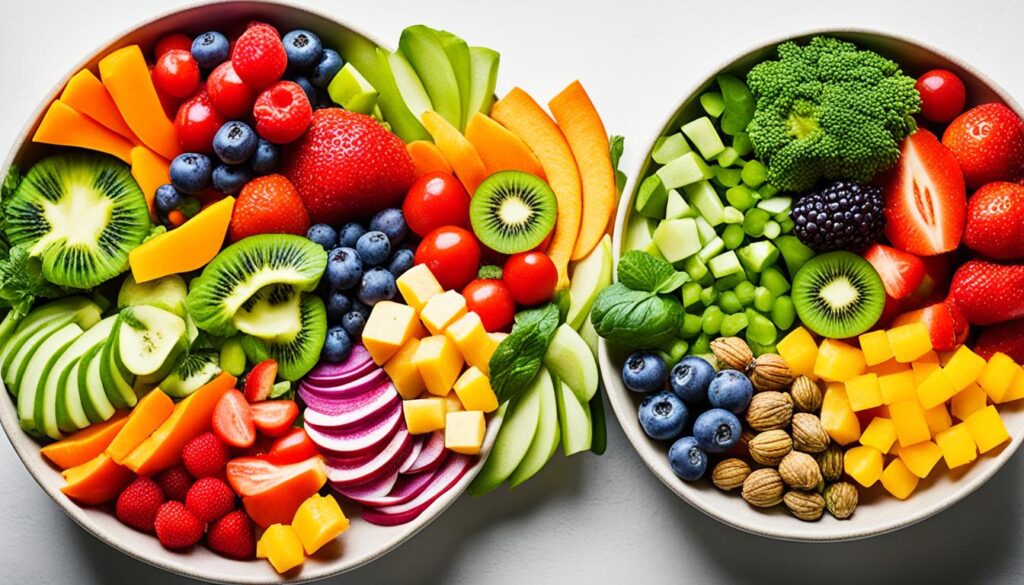
Key Takeaways
- Integrating small, manageable habits into daily routines can lead to significant health improvements.
- Focusing on holistic health practices ensures a well-rounded approach to wellness.
- Beginning with wellness habits for beginners can set a foundation for more complex lifestyle changes.
- Natural health improvement comes from consistent, daily healthy choices.
- Adopting easy wellness routines makes the transition to a healthier lifestyle accessible and sustainable.
Understanding the Mechanics of Habit Formation
At its heart, building healthy habits starts with knowing how they work. We break down habit formation into a simple model known as the habit loop. This is where we begin to grow creating lasting habits. The model is made up of three key parts: the cue, the routine, and the reward.
The cue is the first part. It triggers the habit. It’s a sign that blends into our everyday life, sometimes barely noticed. But, it’s strong enough to kick start our habit-making process. Knowing about cues is crucial for building healthy habits. It helps us understand what starts our behaviors.
Then, we have the routine. This is the habit itself – like going for a run in the morning or meditating at night. In the mechanics of habit formation, this step is where doing it over and over makes the habit stick. Each time we do it, the habit gets more rooted in our life.
At the end, there’s the reward. This is the positive outcome that finishes the cycle and keeps us going. The reward could be feeling good about a clean house or the buzz after a hard workout.
Knowing these steps helps us in creating lasting habits that boost our well-being and lead to a healthier lifestyle. Below, we detail each part of the habit loop:
| Component | Description | Example |
|---|---|---|
| Cue | The trigger that initiates the behavior. | Your alarm clock rings, prompting you to wake. |
| Routine | The habitual behavior itself. | You stretch and start your morning jog. |
| Reward | The positive outcome from performing the routine. | You feel energized and ready to tackle the day. |
When we look at our habits through the habit loop, we can better understand and change our daily patterns. habit formation isn’t just about having strong willpower. It’s about making a system where our desired behavior is both predictable and rewarding. This creates a path to our best selves.
Simple-Healthy-Habits to Kickstart Your Day
Starting your day with healthy morning habits can change your whole day. It makes you ready for productivity and good vibes. A meaningful morning routine gets you ready for any challenges. Let’s look at key practices that make your mornings better.
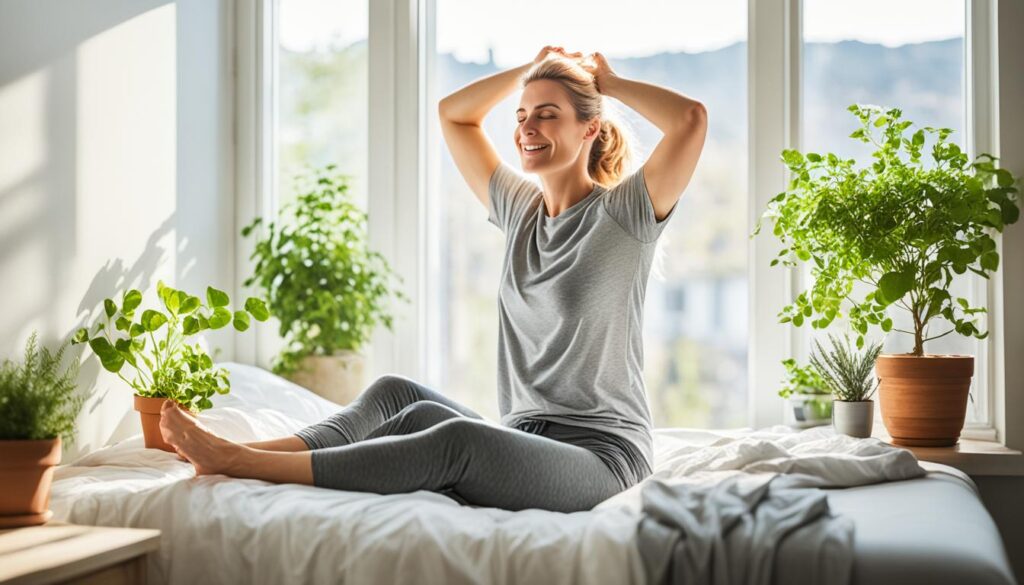
Why Making Your Bed Matters
Making your bed seems small, but it’s a big win. It gives you a sense of achievement and starts a chain of productive actions. A tidy bed also means a clutter-free room, leading to better sleep.
Creating a Personal Morning Ritual
Everyone’s morning routine is different, and that’s okay. Creating a personal morning ritual shows your unique way to wellness. It could be yoga, breathing exercises, or a hearty breakfast. These rituals set a peaceful tone for growth and focus.
Importance of Hydration After Waking Up
Drinking water first thing is also key. Your body loses water while you sleep. Rehydrating kick-starts your day by boosting your metabolism and brain power. It shows how crucial water is for our energy.
Adding these habits to your morning can improve your whole day. A routine with hydration, self-care, and tidiness leads to long-lasting health and joy. Make your morning actions mirror the life you want.
Financial Wellness as a Keystone Habit
Achieving true financial wellness is key to overall well-being. It builds a stable, secure lifestyle. Through smart money management and budgeting habits, you’ll see improvements in many life areas. This section will show financial wellness’s role and provide tips to save money and achieve financial goals.
Fostering financial wellness reduces stress about money and leads to informed life choices.
Managing money is more than tracking income and expenses. It means understanding your financial situation and making goal-aligned choices. Here are strategies to improve your financial health:
- Assess your current financial state
- Set clear, attainable financial goals
- Create a realistic budget for your life
- Spend wisely to avoid debt
- Save for emergencies
- Plan long-term savings for the future
Saving money takes consistency and a new mindset. A key habit is monitoring your expenses. Knowing where your money goes is the first control step.
| Expense Category | Percentage of Budget | Tips for Savings |
|---|---|---|
| Housing | 25-35% | Consider refinancing your mortgage or negotiating rent. |
| Food | 10-15% | Plan meals in advance, shop with a list. |
| Transportation | 10-15% | Use public transport or carpool to cut costs. |
| Savings | 10-15% | Make saving automatic for steady growth. |
| Entertainment | 5-10% | Choose free or cheap activities for fun. |
| Healthcare | 5-10% | Look into HSAs for tax benefits. |
These strategies lay a strong foundation for financial wellness. The aim is making choices that fit your financial dreams while enjoying life.

View financial wellness as a lifelong journey. It changes with your life and goals. By following these habits, you’re on your way to a secure, worry-free future.
Cultivating Gratitude for Enhanced Well-Being
Starting a gratitude practice is like growing a garden. Here, the seeds of daily thankfulness bloom into the beauty of well-being and happiness. We explore the benefits of gratitude, showing how this simple attitude can be a foundation for joy. As we go on this journey, we uncover the transformative power of appreciation. Also, we see how visual reminders of gratitude help us keep this positive outlook.
Journaling for Daily Thankfulness
Journaling for daily thankfulness helps us notice the beauty in every moment. By listing what we’re thankful for, our hearts fill with gratitude. Let’s look at how keeping a gratitude journal leads to more awareness and true happiness.
Visual Reminders of Gratitude
Using visual reminders of gratitude in our spaces can help us remember life’s blessings. These reminders act as mirrors, showing us how rich we are. Items like jars filled with joyful notes or boards showing our achieved dreams keep our gratitude strong.
Transformative Power of Appreciation
The transformative power of appreciation feels like being in a warm glow that lights up our life and others’. By showing and sharing our thanks, we create a wave of love that can change connections in amazing ways.
| Gratitude Practice | Methods | Benefits |
|---|---|---|
| Daily Journaling | Writing down things you are grateful for | Shifts focus to positive life aspects, enhances well-being |
| Visual Aids | Gratitude jars, vision boards | Promotes continuous acknowledgment and attracts positivity |
| Expressing Appreciation | Thank-you notes, verbal recognition | Strengthens relationships, creates positive impact |
Living with gratitude makes a base for ongoing joy and satisfaction. By noticing everyday beauty, we adopt an optimistic view. This not only lifts us up but also helps make the world a better place.

Integrating Movement Into Your Routine
Having a steady exercise routine is about more than staying fit. It’s a key habit for better mental clarity and well-being. To incorporate meaningful movement into your day, plan your workouts well. This makes exercise a must-do, leading to all the great benefits of movement.
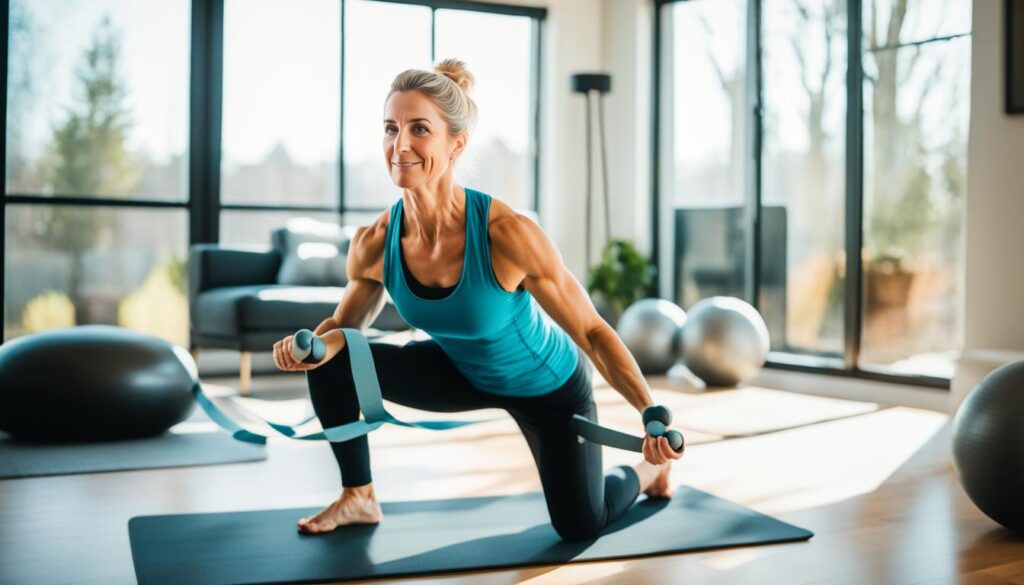
Scheduling Exercise for Consistency
It can seem hard to fit exercise into a busy day. But, by making exercise a priority and scheduling it, you’ll treat it like any key meeting. Being consistent with it then becomes easy, turning it into a regular part of your life. Here are some tips for making physical activity routine:
- Plan your workouts for the week ahead, and consider them as fixed appointments.
- Set reminders on your phone or calendar for your scheduled workout times.
- Vary your exercise modalities to keep your routine engaging and cover different aspects of fitness.
- Recruit an exercise buddy, which can provide motivation and accountability.
The Link Between Physical Activity and Mental Clarity
It’s known that physical activity benefits more than just the body. Physical effort and mental clarity are closely linked. Routine exercise releases endorphins, boosting mood and focus. Also, the benefits of movement include less stress and anxiety, leading to better thinking.
| Benefits of Movement | Impact on Mental Clarity |
|---|---|
| Endorphin Release | Boosts mood and cognitive function |
| Improved Blood Flow to the Brain | Enhances concentration and memory |
| Stress Reduction | Leads to a more focused and calm mind |
| Increased Energy Levels | Sustains mental alertness throughout the day |
By making an exercise routine part of daily life and keeping up with physical activity, you benefit both body and mind. Planning your exercises is an investment in total health. It brings benefits beyond physical spaces, like better mental clarity and life quality.
Nutrition and Mindful Eating
Nutrition is key to a vibrant, healthy life. Engaging in mindful eating improves our relationship with food. It turns mealtime into a moment of awareness and appreciation. Healthy eating habits are about more than food choices. They include how we eat, focusing on being present over eating quickly.
Knowing about a balanced diet helps us make good food choices. Intuitive eating teaches us to listen to our body, ignoring diet trends. Here are useful nutrition tips for positive lifestyle changes.

- Begin each meal with gratitude, thinking about your food’s journey to your plate.
- Chew well to fully enjoy the flavors and textures.
- Avoid distractions like TV or phones during meals for better focus.
- Listen to your body’s signals, eating when hungry and stopping when full.
- Choose diverse foods for a range of nutrients.
“Mindful eating is like a pause button in the rush of life; it opens the door to healthy eating habits and nutritional diversity.”
Eating mindfully lets us create a positive mealtime experience. It boosts both our physical and mental health.
| Mindful Eating Tip | Benefit |
|---|---|
| Savor Each Bite | Enhances meal enjoyment and helps prevent overeating. |
| Listen to Your Body | Supports intuitive eating and less emotional eating. |
| Plan Your Meals | Leads to a balanced diet with varied nutrients. |
| Eat Without Distractions | Better digestion and recognizing when full, aiding weight control. |
| Practice Gratitude | Improves your mindset on food, increasing enjoyment. |
Adding these practices to our life nourishes us. It also brings self-awareness and happiness. Give yourself time to develop healthy eating habits and mindful eating. Base your lifestyle on solid nutrition and a balanced diet.
The Role of Mindfulness and Meditation
A mindfulness practice can lead to peace of mind and good health. You can find calm by starting meditation and learning to breathe deeply. Knowing the perks of mindfulness can motivate people to start this life-changing path.
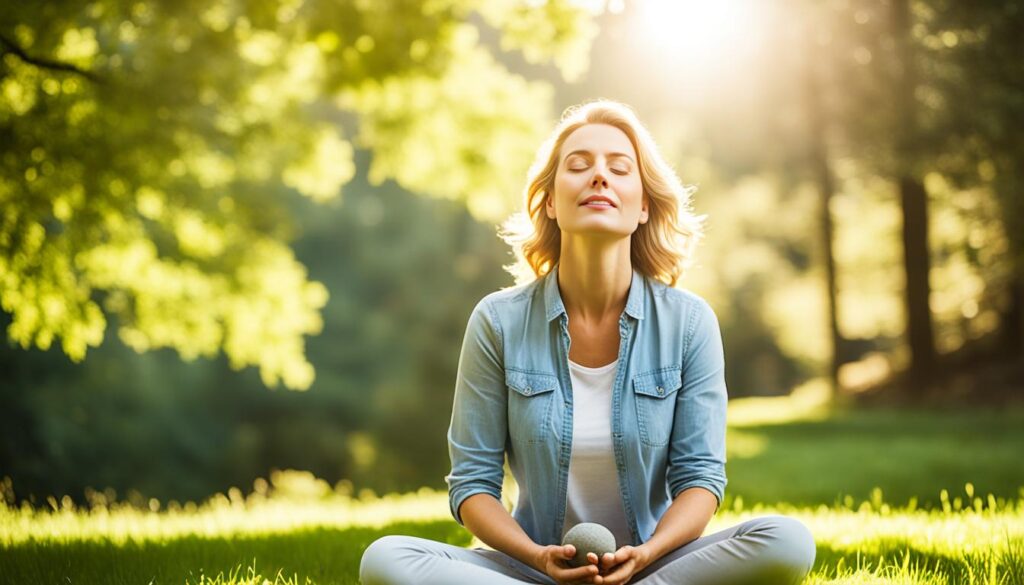
Starting Meditation: Tips for Beginners
Starting to meditate is easy. You don’t need to be an expert. Here’s how you can add meditation into your everyday life:
- **Find a Quiet Space:** Look for a peaceful spot to begin your practice.
- **Set a Regular Time:** It helps to meditate at the same time every day.
- **Use Guided Sessions:** There are apps and websites that offer help for beginners.
- **Start Small:** Just five minutes a day can make a big difference over time.
Deep Breathing Exercises as a Reset Button
Breathing can help you feel calm. Taking deep breaths can be a quick way to relax. These exercises are like hitting a reset button and they offer instant benefits:
- **The 4-7-8 Technique:** This helps reduce stress. Breathe in for 4 seconds, hold it for 7, and exhale for 8.
- **Diaphragmatic Breathing:** This focuses on deep belly breaths to slow your heartbeat and lessen stress.
- **Alternate Nostril Breathing:** Breathing through one nostril at a time can balance your body and mind.
Whether meditation or breathing exercises attract you, every move towards mindfulness means a step towards peace.
Embracing the Power of Tidiness
Creating a space that promotes organized living goes beyond looks. It changes your mental and emotional health for the better. By adopting easy tidiness habits, you can clear up your space. This will not only make it look good but also bring peace and make things run smoother.
Keep these benefits of tidiness in mind:
- Lower stress levels by reducing clutter and mess.
- Better focus because an organized space helps with concentration.
- A happier mood from the calming effect of a neat space.
To add decluttering tips to your daily habits, try these steps:
- Find items you haven’t used in a year and think about giving them away, selling, or recycling.
- Use a “one in, one out” rule to keep things balanced.
- Set specific spots for things you use a lot to avoid losing them.
Getting tidy doesn’t happen all at once. It takes small, thoughtful changes to lead a more organized living. By doing this, you’ll soon see the big benefits of tidiness in everyday life.
“A clear space equals a clear mind, and a clear path to success.” – Marie Kondo, Organizing Consultant

Visualizing Success and Setting Intentions
Starting your journey in personal growth starts with goal visualization. This powerful method turns dreams into reality. By setting intentions, you guide your life towards goals with each step filled with purpose.
Creating a Vision Board for Clarity
Making a vision board is a unique process of defining your dreams. This tool uses images and words that match your goals. It acts as a daily reminder of the path you chose, keeping you focused and driven.
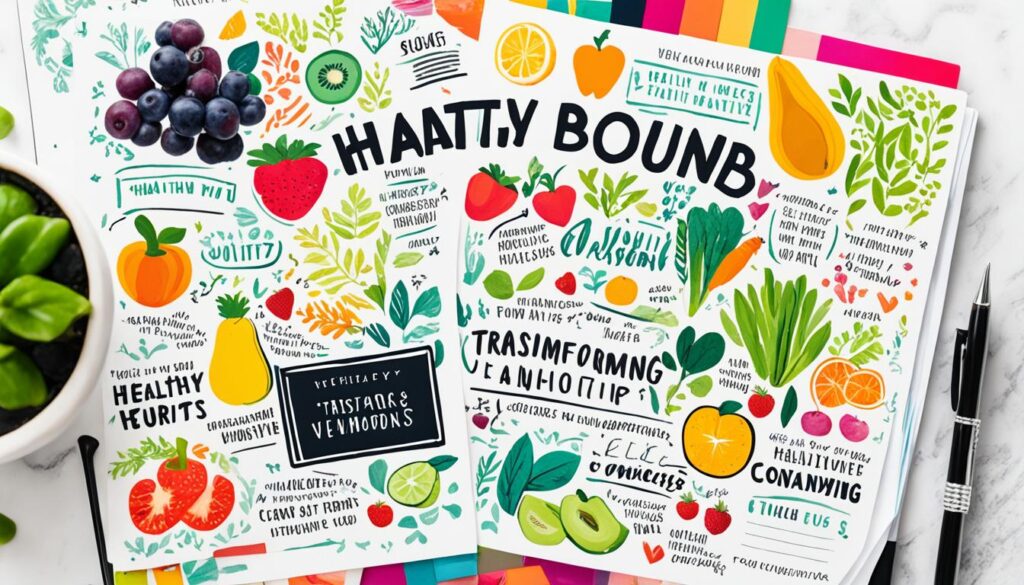
The Daily Practice of Goal Visualization
Success grows from daily goal visualization. Imagine achieving your goals every morning. This bonds your dreams with your actions. It’s more than dreaming; it’s living your goals and making decisions that match your path.
Integrating setting intentions into everyday life crafts a future aligned with your dreams. A daily routine of visualization leads to growth, turning dreams into the success you desire.
Connecting with Nature for Inner Peace
When we step into the outdoors, we feel a deep peace. The link with nature is more than just fun. It’s key to our health. Nature helps us find inner peace amid life’s chaos. Now, let’s explore some outdoor activities that help us connect deeply with nature.

Nature talks to our senses and heals us. The smell of rain, the sound of birds—all form a healing experience. By doing outdoor activities, we refresh our energy. This also helps our mental balance, leading to lasting peace.
| Outdoor Activity | Benefits for Mind and Body |
|---|---|
| Hiking | Improves cardiovascular health, builds strength, and heightens sensory perception. |
| Gardening | Encourages mindfulness, reduces stress, and promotes a sense of accomplishment. |
| Bird Watching | Enhances patience and focus, connects us to wildlife, fosters environmental awareness. |
| Kayaking/Canoeing | Provides a full-body workout, invites solitude or companionship, and offers a different perspective on landscapes. |
| Forest Bathing | Reduces cortisol levels, boosts immune system function, and increases overall well-being. |
Finding peace through nature doesn’t require big adventures. Simple daily moments in nature also boost our well-being. A short walk or watching the sunrise can ground us and bring harmony.
Making Time for Rest and Reflection
In today’s busy world, knowing the importance of rest and reflection is key to well-being and efficiency. Breaks are more than just empty spots in our day. They help our minds recover and spark creativity.

Benefits of Downtime for Creativity Boost
Strategic downtime isn’t wasted time. It’s valuable for downtime benefits, especially for boosting creativity. When we stop active work, our brains can think differently. They make new connections and find fresh solutions.
Taking time to relax or just be can lead to a huge creativity boost. This increase in creativity improves our personal and professional lives. It brings new ideas and breakthroughs.
Implementing Power Hours for Productivity
We explore the idea of power hours for productivity. Setting aside hours for deep focus changes work from being about quantity to quality. In these hours, we avoid distractions, set clear goals, and reach high performance.
What makes power hours work well is planning downtime around them. Calm moments before and after focused work mix insights gained during intense efforts.
- Strategies for downtime: Do things that calm the mind like nature walks, meditate, or read for fun.
- Creating power hours: Find the best times for work and do your most important tasks then, with a clear mind.
- Reflection practices: Keep a journal to think about daily events and feelings, turning those thoughts into lessons.
Adopting these habits does more than help achieve goals. It meets a deeper need for balance, where work and rest together strengthen our minds.
Consistency: The Secret Ingredient of Healthy Living
Starting to live healthily is a great step. But what keeps you going is being consistent in your habits. It’s about doing small things regularly that build strong routines. Like a solid building needs a strong foundation, your lifestyle needs good habits to last.
Holding on when motivation fades is key. It’s sticking to your habits that helps you keep going. This approach builds resilience, helping you overcome challenges. It is not just about having strong willpower. It’s about setting up a system that works with your life’s ups and downs. This keeps your healthy habits going strong.
Staying healthy for the long run is like running a marathon. It requires hard work and discipline. You need to keep assessing and adjusting your routines to stay on track. Every action and every step forward counts. By focusing on consistency, you’ll see big changes happen in your health and life.